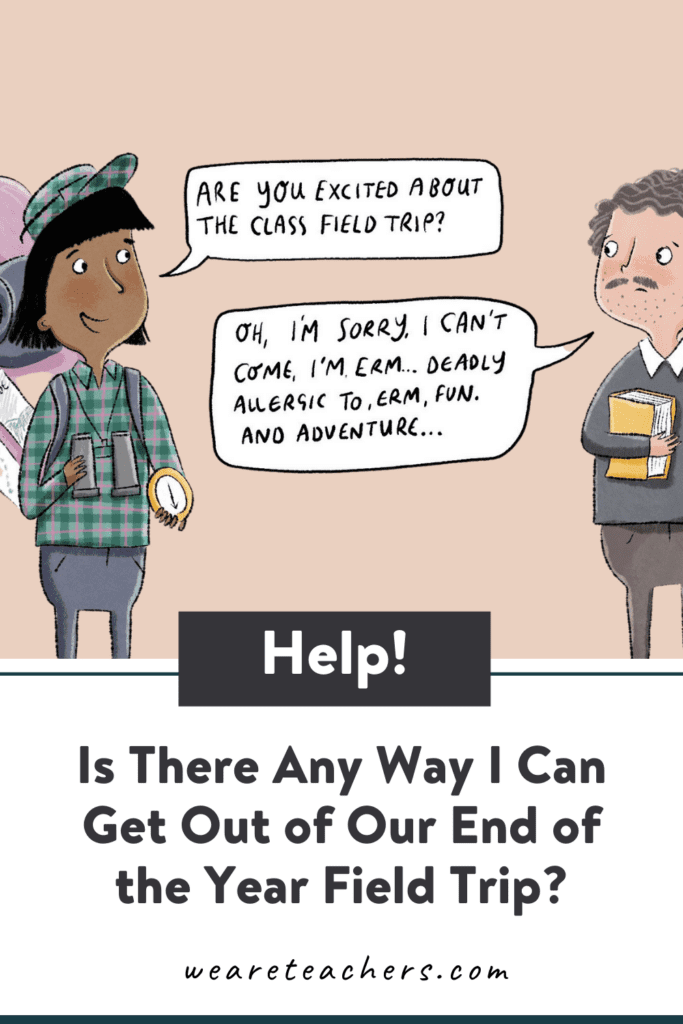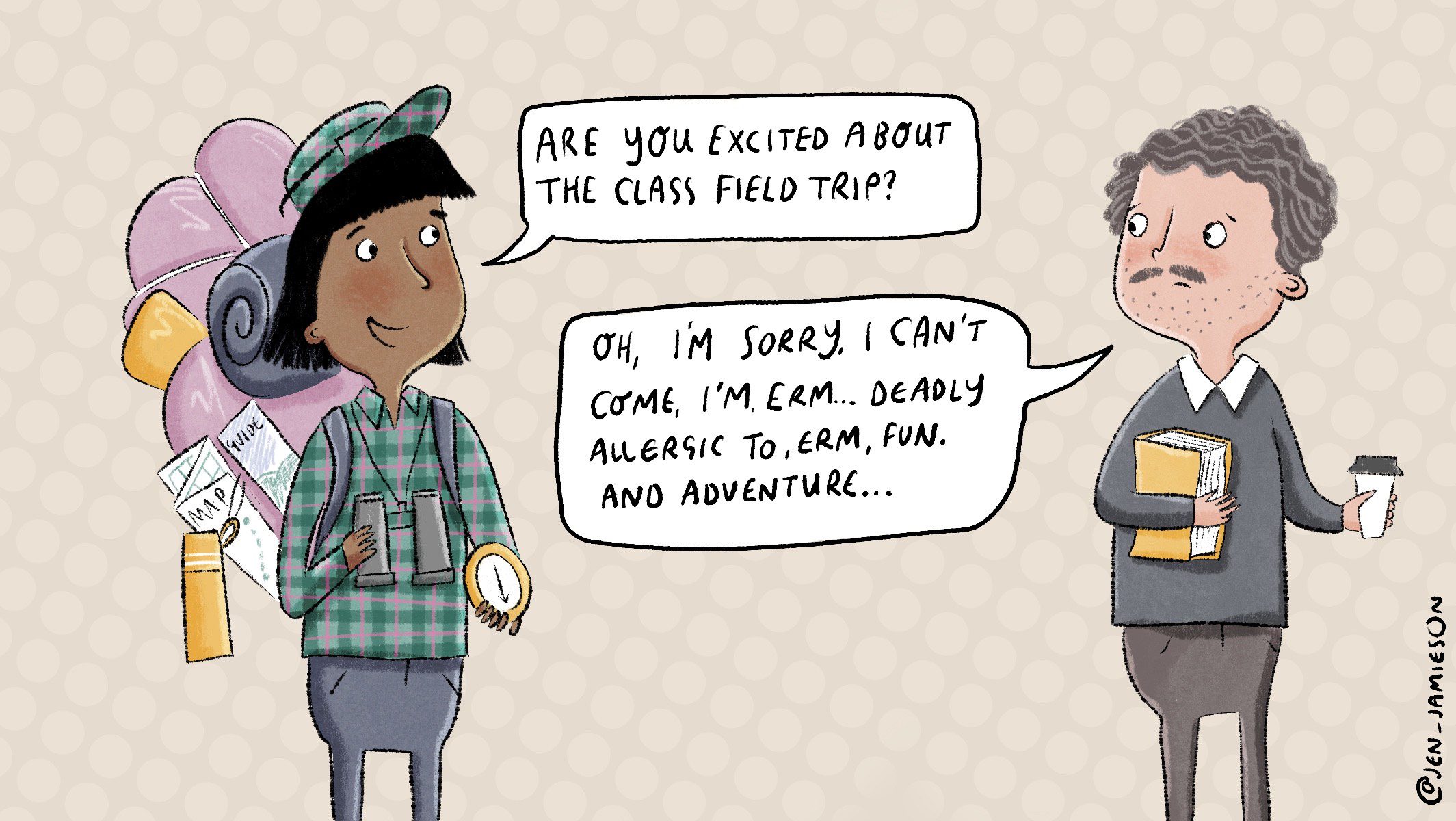Dear WeAreTeachers:
I’m a 3rd-grade teacher, and our team decided to go to a nature preserve to learn about the local Native American Kumeyaay tribe. I’m not an outdoorsy person at all, and I dread this field trip. I don’t like being in the sun. Also, I’m not in great physical shape, and this field trip involves a two-mile hike. I’m super scared of snakes, and rattlesnakes are common there. Yeah, I know the kids will love it. But I’d rather show them a movie. What advice do you have to help me manage? —Overwhelmed by Outdoor Education
Dear O.O.E.,
As educators, we often stretch ourselves way out of our comfort zones, and this hiking trip sounds like such a time for you. Let your students know that there are some aspects of this trip that are challenging you. You can lead by example by working through discomfort and being open to new experiences. You might even find that there are some things you do enjoy that surprised you.
Sharing your candid feelings with your colleagues is the first step in creating a system of support to make this field trip more manageable. It’s time to speak up with your grade level team and administrator and let them know how you are feeling. I’m sure you can put your heads together and figure out a way to distribute various responsibilities for the field trip based on each other’s strengths. Maybe you can deal with the details of organizing the trip, sending out parent information, preparing the volunteers, school lunches, and more. It’s even worth a shot to ask your principal if there is a support staff member that can join your class for the more active parts of the experience.
Take the time to make this experience accessible and as comfortable as possible for you. Prepare yourself! Wear sun protection, good shoes, get a walking stick, bring water, and plan breaks. Lots of little breaks will help! When you stop on the trail, have the kids turn and talk about what they notice and wonder to build curiosity and excitement for their surroundings. Talk to the docent about being as safe as can be around rattlesnakes. Being vigilant and giving rattlesnakes space is the best way to avoid any danger. Definitely don’t provoke a rattlesnake by throwing rocks or sticks, and of course, inform your students about safety and snakes. When I was a 4th-grade teacher, we saw a coiled-up rattlesnake on a hike. The docent had us all stand still until the coast was clear. It was nerve-wracking and also a good reminder about co-existing in nature.
So why are field trips so worth it? What do you still remember about the field trips from your schooling? I still recall going to a local park, rolling down the hills, collecting autumn leaves, making crayon shadings over the veiny leaf lifelines, and making decorations from tangerine skins and cinnamon. The sensory experiences really stuck with me. With COVID restrictions and budget constraints, field trips have taken a back seat, and yet they are powerful community-building experiences. Field trips provide shared experiences that help form relationships among students and volunteers. Authentic conversations increase motivation while also building academic language in meaningful ways.
Roger Dow, president of the U.S. travel association.“When I was growing up, my parents said the 3 Rs (reading, writing, and arithmetic) were important…But for my kids, I made ‘roaming’ the fourth R. We live in a global society, and if you don’t see outside the neighborhood you grow up in, the world will pass you by. Traveling has opened my kids’ eyes. It’s made them more confident and inspired them to reach outside their normal environment to learn and obtain skills to bring them to the next level.” Try and enjoy your trip and feel rewarded knowing your students will care more about the world around them when they have these hands-on, immersive experiences.
Dear WeAreTeachers:
So many kids are worried about the upcoming standardized tests. Frankly, I am too. Given the past couple of years with COVID and compromised learning contexts, I can’t believe we are still moving forward with this type of testing. I have a student who gets so nervous about tests he pulls his eyebrow hairs out. Any ideas of how to make this frustrating context any better? —Make Tests Go Away
Dear M.T.G.A.,
How many educators are sharing your concerns? Many, many educators and families relate to the limitations and detrimental effects testing can have on learners. We all know that tests only show a snapshot of what someone knows and who they are as people. Tests don’t define us or our students. And there is a lot of pressure to perform well on standardized assessments. Edmentum’s blog says it well. “…the whole world has changed in so many ways. Measuring student success against the “where they should be” model is challenged by the delayed learning of the pandemic world. Stress and anxiety are even higher for both adults and children.”
It’s certainly concerning to learn about your student who is pulling out his eyebrow hair. Hopefully, he is set up for some professional support. I’m sure you have inquired, and if the family needs some support in getting help, reach out to your district leadership and counselor to get them the help they need. The American Psychological Association considers test anxiety as a type of performance anxiety that can be triggered by extreme nervousness about taking a test. Often students become anxious because of feelings of worry about failure, shifting from online to in-person, feeling underprepared for the assessment, prior negative test-taking experiences, and more.
There are ways to cope with test anxiety. Start by making sure the kids are familiar with the test-taking platform and have practice in low-pressure ways. I like having kids complete a few test-prep questions collaboratively so they can think and talk and make sense of the challenges together. Regularly practice deep breathing exercises, include seated stretches, offer snacks, ample outdoor movement, games, and other ways to offset the stress and anxiety to perform. And remember that the testing experience is a great springboard to promote a growth mindset with the use of a reflection journal. Ask kids to write about what went well, how they felt, and something they can improve. Writing about these contexts can bring self-awareness and insights.
Also, consider balancing out oppressive testing with other meaningful interactions. Maybe you can plan an art collage project called “My Big Life.” In this digital or print project, students visually express their multiple identities with imagery and words. Protecting time to explore their dreams, hopes, interests, and curiosities will help your learners see the bigger picture. Author Elizabeth Gilbert suggests that “curiosity is our friend that teaches us how to become ourselves. And it’s a very gentle friend and a very forgiving friend, and a very constant one. Passion is not so constant, not so gentle, not so forgiving, and sometimes, not so available.” This reflective and creative arts experience can soften the dread, frustration, and possible anxiety of high-stakes testing. Big breaths to you and your students and all the learners who will be enduring the upcoming test season.
Dear WeAreTeachers:
There is a colleague in my department who has been saying and doing things that feel inappropriate to me. He makes comments on what I’m wearing and talks about my body. One day he said, “Your silky dress must be caressing your skin.” Often when he sees me, he touches my shoulder and back a little too long. He even kissed me on my cheek after the summer break, and it was a wet kiss! He’s very well respected as the head of the English department. He is married, handsome, and charismatic. People love him, but he’s crossing a line with me, and I don’t know how to deal with it. I haven’t told anyone yet. I don’t want people to think I’m a drama queen. What should I do? Is this really sexual harassment? —Me Too
Dear M.T.,
You aren’t alone. And you definitely are not a drama queen. It’s clear that you didn’t seek out these unwanted advances from your colleague. Remember that you have the right to work in a safe work environment. I’m so sorry that you are experiencing these unwanted forms of sexual harassment. This is sexual harassment. Period. Your colleague’s comments and physical touch have crossed a line. You are experiencing unwelcome sexual advances, and that’s not OK.
Even though it can feel super challenging to report, because of this person’s status at your school and being popular, it’s important to follow through. Other co-workers may have been harassed too. It’s absolutely normal to feel afraid and concerned about reporting sexual harassment. Survivors of sexual harassment often want the advances to stop, but may endure the comments and touch to avoid any escalation and threat of danger.
I experienced something similar at work when I was a new teacher, and I still remember my heart racing when I told my principal. I was given support right away, and it was a relief feeling seen and heard by my leader. Our administrators have the responsibility to prevent and correct workplace harassment. I was surprised to learn that one in four women will experience sexual harassment in the workplace. And it’s deeply concerning that 75 percent percent of the survivors don’t file a complaint in their workplaces.
So, why don’t survivors report sexual harassment? Often people do not trust their leadership or human resources departments. Many feel like their current or future work will be negatively impacted. Tarana Burke, the founder of the Me Too movement and American author and activist, emphasizes that “The work is more than just about the amplification of survivors and quantifying their numbers. The work is really about survivors talking to each other and saying, ‘I see you. You have my support. I get it.'” I read Tarana Burke’s “Unbound: The My Story of Liberation and the Birth of the Me Too Movement.” Trust me that this book is deeply moving, hopeful, electric, and a must-read. If you need the inspiration to speak up, read or watch Tarana. I promise you won’t regret it.
Do you have a burning question? Email us at askweareteachers@weareteachers.com.
Dear WeAreTeachers:
I’m a middle school teacher, and my principal is mediocre at best. I get the feeling he’s just phoning it in. At the same time, he has high expectations for us teachers. So he’s not my favorite, but now he’s bringing his dog to school every day, and it’s driving me crazy. It’s not even trained. It’s so badly behaved, and he lets the dog walk around the office off-leash once the students are gone. This is not a service dog, and I’m pretty sure he doesn’t have permission. How is this OK? Why are there different sets of rules for principals and teachers?Check out our Best Field Trip Ideas for Every Age and Interest (Virtual Options Too!)
Want more advice column? Visit our Ask WeAreTeachers hub.
Illustration: Jennifer Jamieson



